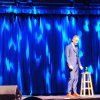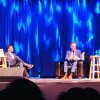BLACK: Laboured logic in former friend’s diatribe against Jordan Peterson
In the laboured prose of an emeritus tenured academic, Professor Bernard Schiff, no doubt accustomed to audiences held captive by their desire for a passing grade, wrote a piece titled, “I was Jordan Peterson’s strongest supporter. Now I think he’s dangerous.”
To borrow Jon Kay’s mots juste, it was an “interminable screed.”
Schiff’s opening gambit leveraged the near-universal distaste among the Toronto highbrow for evangelism by comparing Peterson’s public discourse to the proselytization of deceased American pastor Billy Graham.
Then came
a drive-by ad hominem spray-and-pray, accusing Peterson simultaneously of dishonesty, deficient intellectual integrity, and of lacking common decency. Rather than utilizing the voluminous space afforded him by The Star’s editors (5,388 words) to support this malicious diatribe, he deftly parried the need for such bother by professing his former support for Peterson. Implying that since he, Peterson’s friend and mentor, had changed his position so drastically, there must have been a good reason for it.
Tellingly, mid-defamation he was unable to resist the temptation to self-aggrandize, purporting to be the sole reason Peterson was hired by the University of Toronto.
This claim seems fatuous and implausible given Schiff’s own admission that Peterson had an impeccable CV, “terrific references and a pedigree that included a PhD from McGill and a five-year stint at Harvard as an assistant professor.” Yet, the university would have passed on Peterson were it not for his (Schiff’s) championship.
The piece then attempts to detail a series of retrospective warning signs that Peterson would become a dangerous demagogue — a transition Schiff believes is happening.
The first warning was Peterson once objected to the oversight of a research ethics committee. Schiff makes no suggestion of any ethical lapses and admits “there was nothing contentious about his research,” but insists Peterson’s mere objection to bureaucratic oversight was tantamount to a callous disregard for the well-being of his research subjects.
The next warning was a single teaching review panning Peterson’s course from “one astute student,” who objected to “delivered truths.” Ironically, Schiff cherry-picks one student review from an ocean of mostly “excellent” feedback to justify accusing Peterson of cherry-picking to present “conjecture as statement fact.” The reality is that a liberal arts degree, speaking as someone who earned one not so long ago, is obtained through the regurgitation of “delivered truths” – often, bigoted leftist ones.
Partway through, Schiff
reveals the true nature of his grievance. His daughter is trans, making him naturally sensitive to trans issues and susceptible to misconstruing Peterson’s position.
At about the midway point, Schiff’s leaps in logic begin to create such vast expanses they can no longer even pretend to clear the gap.
If Peterson really cared about free speech, Schiff posits, he would have openly engaged in hate speech against the “already-protected groups” listed in the Human Rights Act. Since Peterson only opposed Bill C-16 it must be because he is specifically targeting trans people.
Common sense would suggest the changed variable was C-16’s “compelled speech” (i.e. the forced use of invented gender pronouns) rather than mere speech prohibition – a distinction Peterson has often cited as the catalyst for his stand.
Instead, Schiff theorizes Peterson allegedly scapegoated trans people as a means to seize power via the demagogic exploitation of society’s unconscious predisposition toward trans bashing. Schiff suggests deep-seated transphobia is evident because zoologists in the Middle Ages discriminated against the female spotted hyena on account of its penis-sized clitoris.
The piece devolves into a comprehensive literature review and meta-analysis of recent hit pieces and hatchet jobs on Peterson.
Schiff’s first 5,000 words not-so-subtly set the stage. He calls Peterson a “powerful orator,” twice. He belabours the supposed scapegoating of trans people,
while entirely sidestepping the actual issue of compelled speech. He inelegantly references Madeleine Albright’s book,
Fascism: A Warning, then quotes her description of the shared characteristics of authoritarian leaders, implying the description applies to Peterson. He follows with the tedious and debunked denigration of Peterson as an alt-right “darling,” activating the “dark desires” (a phrase he uses three times) of the mob. Finally, Schiff says he could not keep silent about Peterson “for historical reasons.” The last purposeful tug of the kimono’s sash reveals a desperately contrived Hitler analogy.
Throughout the piece, Schiff fleetingly raises one legitimate concern, which if he truly were Peterson’s friend,
he’d have raised privately and in person. The sudden attainment of power and influence is uneasily accommodated by anyone. Peterson’s rise would be a profound shock to even the sharpest psyche. The overnight transformation from lowly professor to international celebrity and iconoclast, coupled with an instantaneous, concurrent, and sustained blast of both mass laudation and revilement would be deeply transformative.
It will be interesting to see how Peterson copes
and I hope for his sake not all his friends are as fickle as Schiff.





